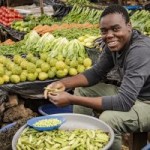A new journal article examines the role of gender in various pathways to food security in Malawi, emphasizing areas for improved access to agriculture and nutrition information along these pathways. The article, published in Global Food Security, also considers the implications of gender targeting for agriculture and nutrition extension services. The authors propose a gendered >> Read more Source: Malawi Strategy Support Program
Discussion Paper 1792: A Critical Review of Malawi’s Special Crops Act and Agriculture Act
Agriculture in Malawi holds special significance, both as a means of household food security and household livelihood, as well as being a revenue-generating sector for the nation. As such, legislation surrounding the governance of Malawi’s agricultural sector holds a place of importance. A recent study conducted by IFPRI and NAPAS:Malawi offers a critical review of >> Read more Source: Malawi Strategy Support Program
Demand and Food Security Analysis Training
The Ethiopia Strategy Support Program (ESSP) of IFPRI and the Ethiopian Economics Association (EEA) organized a training on Demand and Food Security Analysis on January 1 and 2, 2019 for members of the EEA. The training, which was attended by thirty five people over the course of two days provided an insight how to estimate demand >> Read more Source: Ethiopia Strategy Support Program
Has the provision of legume seeds subsidies affected dietary diversity? Evidence from FISP
In Malawi, maize is life – the cereal is the main staple with more than 70 percent of all agricultural plots in the country used for maize farming. This strong dependence on maize has led to a poorly diversified agricultural system with limited dietary diversity. The government of Malawi implements a Farm Input Subsidy Program >> Read more Source: Malawi Strategy Support Program
News: Investing in Evidence to End Hunger: A Closer Look at National Opportunities
New evidence continues to signal a rise in world hunger and a reversal of trends after a prolonged decline. In 2017, the number of undernourished people is estimated to have increased to 821 million – around one out of every nine people in the world. The alarming signs of increasing food insecurity and high levels of different forms of malnutrition are a clear warning that there is considerable work to be done to make sure we “leave no one behind” on the road towards achieving SDG 2. Achieving it requires renewed efforts through new and innovative ways of working and hinges on effective partnership. Source: IFPRI Egypt Country Office
- « Previous Page
- 1
- …
- 49
- 50
- 51
- 52
- 53
- …
- 57
- Next Page »




